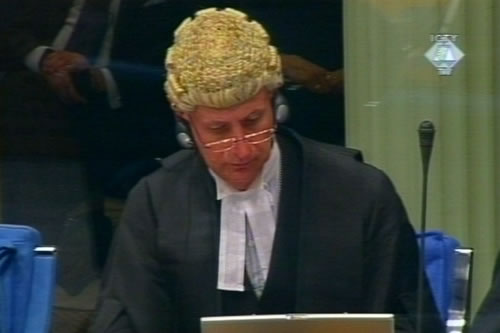Home
KAY: DECISION ON THE ASSIGNMENT OF COUNSEL “UNIMPLEMENTABLE IN PRACTICE”
Court hears request by English lawyers to withdraw from the case as assigned counsel; Steven Kay considers the decision of the Appeals Chamber to be “unimplementable in practice”; Milosevic’s “pragmatic” and “amazingly succinct” contribution to the debate.
 Steven Kay
Steven Kay After a three-week break, the trial of Slobodan Milosevic continued today with the hearing of Steven Kay and Gillian Higgins’ request to withdraw from the case as assigned counsel. Two-thirds of the time was spent debating whether the Trial Chamber has jurisdiction to rule on the issue or whether it is in the jurisdiction of the registry that appointed the English lawyers on 3 September 2004.
Milosevic intervened only once today, very briefly. When the presiding judge asked him to state his views on the issue of jurisdiction, Milosevic noted that, “The Trial Chamber put Mr. Kay in the position he is now in with its decision,” and accordingly, “it would be logical to assume that it has jurisdiction to resolve the situation.” Judge Robinson said Milosevic’s approach was “very pragmatic,” while prosecutor Nice commended him for the “amazingly succinct” presentation of his view.
After the Chamber was satisfied it had jurisdiction, the hearing turned to the assigned counsel’s request for withdrawal from the case. But rather than deal with the withdrawal of the English lawyers, the debate centered more on whether it was possible at all to assign counsel to an accused who refuses to cooperate with such counsel. According to Kay, it is not possible, since the professional code of conduct binds defense counsel to follow the instructions of the accused concerning the goals he wants to achieve before the court. If the accused refuses to give any instructions to defense counsel, he cannot follow them and can only guess as to the actual goals of his client.
The presiding judge reminded Kay that on 1 November, the Appeals Chamber affirmed the decision to assign counsel to Slobodan Milosevic and ordered the Trial Chamber to establish a new working regime in court that will enable the accused to conduct his own defense when his health permits, calling and questioning witnesses and presenting legal arguments. When judges asked whether this meant the decision of the Appeals Chamber was “simply unimplementable” and that “no defense counsel can be assigned if the accused is opposed to it,” the English lawyer answered in the affirmative. According to Kay, the second part of the decision is particularly impossible to implement: if Milosevic’s health deteriorates, the presence of assigned counsel will make it possible for the trial to continue even if the accused has been rendered “temporarily unable to participate in it.”
The judges, however, do not agree with Kay’s assessment that the Appeals Chamber decision – restoring Milosevic’s right to represent himself on the one hand, while affirming the Trial Chamber’s decision to assign counsel on the other – cannot be implemented. The Trial Chamber, Judge Robinson noted today, “must implement the decision and reconcile these two aspects thereof.”
Judging by the questions judges put to Steven Kay today, they are not at all in favor of granting the assigned counsel’s request to withdraw. The prosecution and the accused Milosevic will state their views tomorrow as the hearing continues. On Thursday, the sixth defense witness is expected to testify. This will be the first witness to be examined in chief by the accused himself.
Linked Reports
- Case : Milosevic Slobodan - "Kosovo, Croatia and Bosnia"
- 2004-11-03 PREPARATIONS UNDERWAY FOR THE CONTINUATION OF THE MILOSEVIC TRIAL
- 2004-11-01 DEL PONTE FEARS MILOSEVIC WILL GO ON "SICK LEAVE" AGAIN
- 2004-11-01 MILOSEVIC ASSUMES PRINCIPAL ROLE AGAIN
- 2004-11-10 CAN A “STUBBORN ACCUSED” BE ASSIGNED COUNSEL?
- 2004-11-11 “TIGHT” DEADLINES FOR MILOSEVIC’S DEFENSE
- 2004-11-16 MILOSEVIC A VICTIM OF DEMONIZATION?
